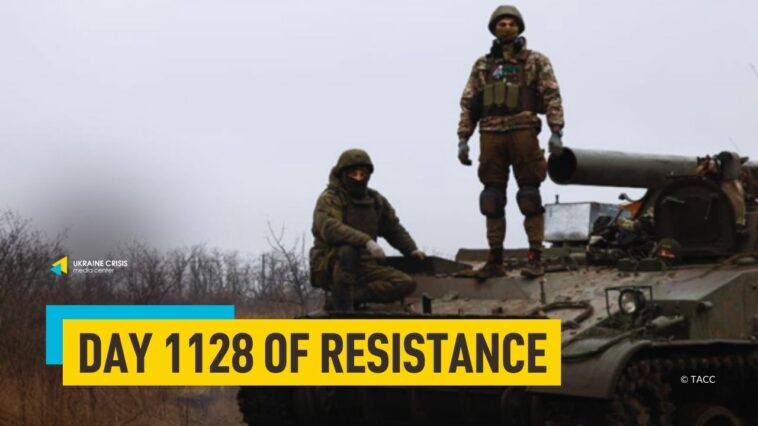Russia is preparing a spring offensive on Sumy and Kharkiv regions, Zelenskyi says. Ukraine’s allies meet in Paris to discuss a “reassurance force”. More than two-thirds of Ukrainians trust President Zelenskyi, a poll finds.
Russia preparing spring offensive on Sumy, Kharkiv regions, Zelenskyi says
Russia is preparing a fresh offensive on Sumy and Kharkiv regions, Ukrainian President Volodymyr Zelenskyi said in an interview with France’s Le Figaro newspaper published on Wednesday.
Asked if he believes that Russian leader Vladimir Putin uses peace talks to win more time and prepare for a new offensive, Zelenskyi said: “I can confirm that Putin is trying to buy time and is preparing for a spring offensive. We can see the preparations for this future operation.”
Ukraine has shared intelligence with its allies, he added.
“We must look at the situation with eyes wide open: Putin is preparing a new offensive, notably in Sumy and Kharkiv regions. He already wanted to launch this operation eight months ago, but we prevented him from doing so thanks to our intervention in Kursk,” Zelenskyi said, according to the translation by Le Figaro.
On March 18, spokesperson for Ukraine’s Siversk operational and tactical group of forces, Colonel Vadym Mysnyk said on national television that Russia was deploying troops that fought in Kursk near the state border across from Ukraine’s Sumy region.
On March 20, Zelenskyi said Russia was massing forces on the Sumy axis, aiming to push Ukrainian troops from the Kursk region. Yet Ukrainian forces “are making unexpected steps in a different direction,” he added.
On March 24, spokesperson for Ukraine’s Border Guard Service, Andriy Demchenko said Russian sabotage groups were trying to expand the area of cross-border raids into Sumy region and take the fighting from Russia’s Kursk to Ukraine.
Ukraine’s allies meet in Paris to discuss “reassurance force”
France hosted the summit of the “coalition of the willing” on Thursday that, among other things, discussed plans for a future “reassurance force” to help ceasefire. Ukrainian President Volodymyr Zelenskyi was in attendance.
The participants will discuss continued steadfast support for Ukraine, along with the strengthening of the Ukrainian army and defense industry, which are two of the key security guarantees for our country, the Office of the Ukrainian President said ahead of the meeting.
They will separately address all issues related to the peace negotiation process and the mechanisms for implementing the first steps of the ceasefire, it continued.
“The leaders will also discuss the prospect of deploying guarantee forces in Ukraine as part of a future peace settlement backed by the United States,” the statement reads.
A “coalition of the willing” led by the UK and France is a group of countries that could provide boots on the ground in Ukraine in the event of a ceasefire.
On March 12, defense ministers of the UK, France, Germany, Italy and Poland met in Paris to discuss how to step up European support for peace in Ukraine and consolidate a common approach to European defense within NATO and EU frameworks.
UK Prime Minister Keir Starmer, in a virtual summit of the “coalition of the willing” on March 15 outlined plans to deploy a Western peacekeeping contingent of over 10,000 troops to Ukraine.
More than 30 countries are expected to be involved in the “coalition of the willing” to support Ukraine, Starmer’s spokesperson told reporters on March 17.
More than two-thirds of Ukrainians trust President Zelenskyi, poll finds
Sixty-nine per cent of Ukrainians say they trust President Volodymyr Zelenskyi, according to a survey by the Kyiv International Institute of Sociology. The poll was conducted between March 12 and March 22.
“As of the second half of March 2025, 69 per cent of Ukrainians trust President Zelenskyi and 28 per cent distrust him. The trust-distrust balance was +41 per cent,” the pollster said in a comment to the survey.
Ukrainians maintain high levels of trust in President Zelenskyi despite questions to the political leadership that have accumulated over time and despite fair criticism of the government’s decisions, executive director of the Kyiv International Institute of Sociology, Anton Hrushetskyi explained. Ukrainians also see him as a legitimate leader, he said.
“High levels of trust (and their recent growth) primarily come from the public’s view of Zelenskyi as president and advocate of Ukraine’s interests. [His high levels of approval] are to a lesser extent about the public sympathizing with him on a personal level or favoring him politically. Ukrainians are conscious of an existential threat that Russia and Russians pose, and their top priority is standing up to the ruthless enemy,” he argued.
The survey was conducted through computer-assisted telephone interviews (CATI) based on a random sample of mobile telephone numbers. The total sample consists of 1,326 Ukrainians ages 18 and older who live in government-controlled Ukrainian territory.
Opinions of Ukrainians in occupied areas or those who left the country after the full-scale invasion were not included in the sample. Internally displaced persons were among the survey respondents.




